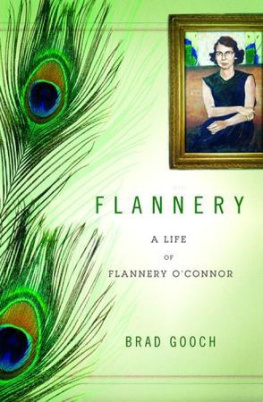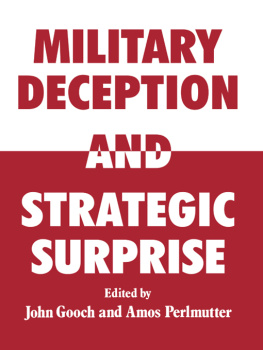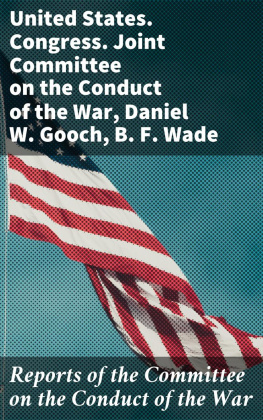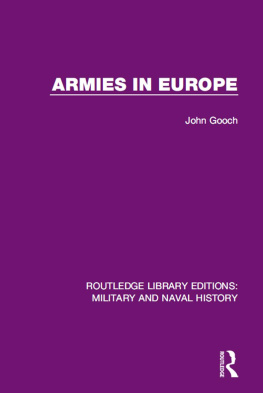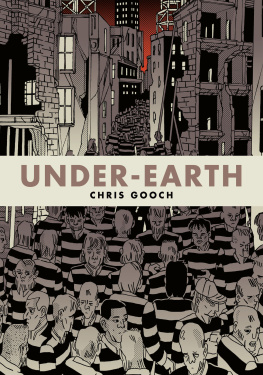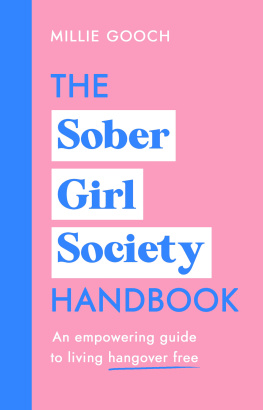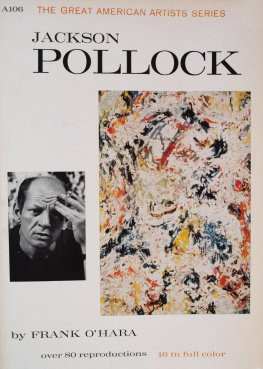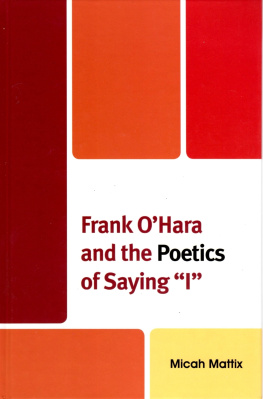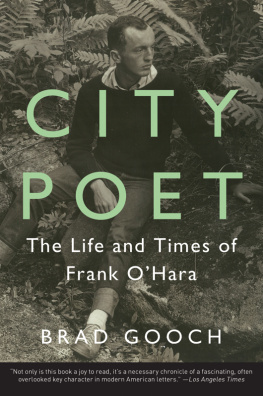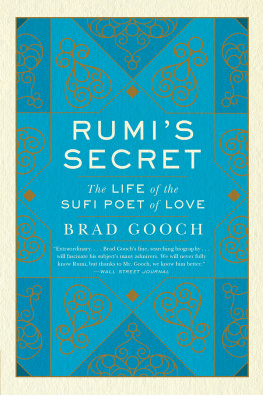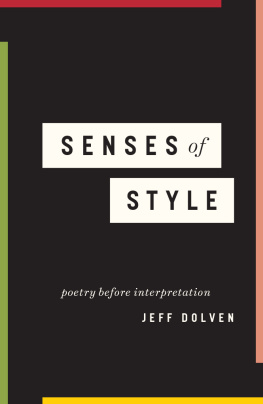Brad Gooch - City Poet: The Life and Times of Frank OHara
Here you can read online Brad Gooch - City Poet: The Life and Times of Frank OHara full text of the book (entire story) in english for free. Download pdf and epub, get meaning, cover and reviews about this ebook. year: 2014, publisher: HarperCollins, genre: Non-fiction. Description of the work, (preface) as well as reviews are available. Best literature library LitArk.com created for fans of good reading and offers a wide selection of genres:
Romance novel
Science fiction
Adventure
Detective
Science
History
Home and family
Prose
Art
Politics
Computer
Non-fiction
Religion
Business
Children
Humor
Choose a favorite category and find really read worthwhile books. Enjoy immersion in the world of imagination, feel the emotions of the characters or learn something new for yourself, make an fascinating discovery.

- Book:City Poet: The Life and Times of Frank OHara
- Author:
- Publisher:HarperCollins
- Genre:
- Year:2014
- Rating:5 / 5
- Favourites:Add to favourites
- Your mark:
- 100
- 1
- 2
- 3
- 4
- 5
City Poet: The Life and Times of Frank OHara: summary, description and annotation
We offer to read an annotation, description, summary or preface (depends on what the author of the book "City Poet: The Life and Times of Frank OHara" wrote himself). If you haven't found the necessary information about the book — write in the comments, we will try to find it.
City Poet: The Life and Times of Frank OHara — read online for free the complete book (whole text) full work
Below is the text of the book, divided by pages. System saving the place of the last page read, allows you to conveniently read the book "City Poet: The Life and Times of Frank OHara" online for free, without having to search again every time where you left off. Put a bookmark, and you can go to the page where you finished reading at any time.
Font size:
Interval:
Bookmark:

For my parents
I cant even enjoy a blade of grass unless I know theres a subway handy, or a record store or some other sign that people do not totally regret life.
Frank OHara
Meditations in an Emergency
Contents
M aureen OHara, the sister of Frank OHara, has been remarkably supportive of this biography from the beginning. I owe her my deepest thanks for allowing me access to all of her brothers unpublished letters, manuscripts, journals, and datebooks, as well as to family photographs. She opened difficult doors for me by encouraging other family members and friends to meet with me. Most helpful to me as well in OHaras immediate family circle: his brother, Philip OHara; first cousin Mary F. OHara; aunt Catherine F. OHara; uncle Thomas Broderick; sister-in-law, Ariel OHara; and niece, Alison OHara.
I also wish to thank those who piqued my interest in OHaras poetry and lifenot just during the past five years of writing this biography but over the past twenty years. Foremost among these is Joseph LeSueur, the poets roommate for nearly a decade, who was generous with his time, his talk, and even drafts of his own memoirs. It was at dinner parties at LeSueurs Manhattan apartment during the 1970s that I began to receive my unofficial education in Frank OHara. Missing these days is a constant guest at those dinners and a close friend of OHaras near the end of his life, J. J. Mitchell. I regret more than I can say his death from AIDS in 1986, which prevented me from speaking with him about OHaraand so many other mattersas I wrote this biography. Among those who brought me closer to OHaras poetry early on, I think as well of Kenneth Koch, whose classes at Columbia College helped make the poems accessible and exciting to this undergraduate.
I owe much to my publisher at Knopf, Sonny Mehta, who not only commissioned this biography but offered illuminating advice at several crossroads along the way. My editor, Shelley Wanger, paid careful attention to the manuscript, which she read unusually closely. I feel grateful for her inspired combination of charm and precision. For support, excitement, and hard work, I must thank my agent, Joy Harris. This project at various times has required all of her various talents.
I would also like to thank The William Paterson College of New Jersey for time off from teaching to complete this manuscript. Many professionals at other libraries and resource centers were invaluable in helping with the labor of research. I am especially grateful to Joe Lane, St. Johns High School; Reverend Paul J. Nelligan, S.J., college archivist, College of the Holy Cross; Mr. Pasquale Quidamo, retired principal, Dougherty Memorial High School; Robert Wilson, Grafton Historical Society; Ruth Emmanuel, New England Conservatory; William H. Morgan, executive director, USO of Northern California, San Francisco; Adrian Fisher, librarian, the Harvard Club; Rodney Dennis, Houghton Library, Harvard University, as well as his assistant, Elizabeth Falsey; Jeanne Newlin, Harvard Theatre Collections; Guy Sciacca, Harvard University Registrars Office; Andrea Beauchamp, the Hopwood Room, University of Michigan at Ann Arbor; Kathy L. Beam, librarian, Department of Rare Books and Special Collections, University of Michigan at Ann Arbor; Rona Roobe, librarian, Museum of Modern Art, and her assistants Rachel Wild and Apphia Lod; Ron Maggliozi, Film Department, Museum of Modern Art; Cynthia Farar, research librarian, Harry Ransom Humanities Research Center, University of Texas at Austin.
Various people gave unusually of their time, hospitality, or creativity. Among the many of these to whom I feel especially indebted: John Ashbery, Kenneth Koch, and Cheri Fein for reading and commenting on the manuscript in its entirety. Bill Berkson, who regularly mailed me notes of memories or anecdotes; Kynaston McShine, for scrutinizing the pages on the Museum of Modern Art; Lawrence Osgood, for working closely with me on the chapters about Harvard and Ann Arbor; J. M. Elledge, for sending me his Frank OHara: To Be True to a City ; Jan Erik Vold, for his album of OHara poems translated into Norwegian and set to jazz, Den Dagen Lady Dode ; Harold Snedcof, for a copy of his unpublished 1970 Brown University dissertationthe first on OHara; Jeffrey Julich, for his unpublished essay, Locus Solus: The Magazine; Nora Sayre, for an unpublished chapter on the Poets Theatre from her book Previous Convictions: A Journey Through the 1950s ; Vincent Warren, for his hospitality as well as a lively tour of Montreal during my weekend visit; Mary Guerin, housekeeper during OHaras childhood, for a hand-crocheted potholder; Phil Charron, for finding his diary entry from 1947 describing the funeral of Russell OHara; Jack Stuart, Sr., for lending me his copy of the ninth reunion souvenir book of the U.S.S. Nicholas ; Rosemarie Hester and Stephen Darwall, for allowing me to stay with them during a visit to Ann Arbor; the Harvard Faculty Club, for their hospitality during an extended period of research on campus; Elizabeth Delude-Dix and her son, Dermot, for their kindness on my several trips to Boston and Grafton.
Most of OHaras friends were incredibly cooperative. His legendary capacity for friendship is proved once again by the size of the list of those who cooperated with his biography. To these, and to others who helped, my warmest thanks: Edward Albee; Donald Allen; Amiri Baraka; Mildred Bean; Thomas Benedek; Peter Bouthiette; Joe Brainard; Jim Brodey; Harold Brodkey; Scott Burton; Wynn and Sally Chamberlain; Jules Cohen; William Cronin; Sharon DeLano; Tibor de Nagy; Diane di Prima; Richard Door; Elsa Baldwin Ekblaw; Kenward Elmslie; Frederick English; Lawrence Ferlinghetti; Edward Field; Robert Fizdale; Harold Fondren; Raymond Foye; Helen Franc; Helen Frankenthaler; Jane Freilicher; Arthur Gartaganis; Allen Ginsberg; John Giorno; Michael Goldberg; Morris Golde; Edward Gorey; Maxine Groffsky; John Gruen and Jane Wilson; Barbara Guest; Donald Hall; Grace Hartigan; Stephen Holden; Molly Howe; Irma Hurley; Jasper Johns; Hettie Jones; Howard Kanovitz; Alex Katz; Heidi Kleinmann; Ruth Kligman; Kenneth Jay Lane; Jack Larson; Roy Leaf; Leo Lerman; Alfred Leslie; Frank Lima; Alison Lurie; Gerard Malanga; Sister Mary Barbara; Harry Matthews; Luke Matthiessen; Porter McCray; Taylor Mead; James Merrill; Michael Milan; George Montgomery; Rene Neu; Alvin Novak; Thomas OBrien; Genevieve Kennedy OConnor; James OConnor; Ron Padgett; Spiros Paras; Waldo Rasmussen; George Rinehart; Clarice Rivers; Larry Rivers; Steven Rivers; Burton Robie; Cervin Robinson; Gaby Rodgers; Hans Rohwedder; Ned Rorem; Gordon Rosenlund; Jerome and Judy Rubenstein; Kenneth Ruzicka; D. D. Ryan; Paul Schmidt; James Schuyler; David Shapiro; Silas Simms; John Simon; D. W. Singleton; Vito Sinisi; Derrick Smit; Patsy Southgate; Douglas Starr; Virgil Thomson; Tony Towle; Chuck Turner; Dan Wagoner; Madeleine Warren; William Weaver; Arnold Weinstein; Chester Williams. My apologies as well to anyone whose name I may have inadvertently forgotten.
I also wish to thank the research assistants who helped: Amy Aronson, Eric Croszek, Caroline Payson, and Kim Cartright. Mostly, though, I wish to thank Sarah Lindemann, whose job defies any simple title or description. Over several years she worked with me closely, researching background; organizing a mass of interviews, secondary articles, and books; making the telephone calls required to find the odd sailor mentioned in a World War II letter of OHaras or an elusive Harvard classmate. Her time spent at the Harvard Club, the Museum of Modern Art, and the New York Public Library Reading Room added depth to both our understandings of OHaras milieu. Our discussionsoften heated, often extendedcontributed greatly to my arriving at conclusions that I felt were tested. Her challenging readings of my pages were an inspiration.
Font size:
Interval:
Bookmark:
Similar books «City Poet: The Life and Times of Frank OHara»
Look at similar books to City Poet: The Life and Times of Frank OHara. We have selected literature similar in name and meaning in the hope of providing readers with more options to find new, interesting, not yet read works.
Discussion, reviews of the book City Poet: The Life and Times of Frank OHara and just readers' own opinions. Leave your comments, write what you think about the work, its meaning or the main characters. Specify what exactly you liked and what you didn't like, and why you think so.

